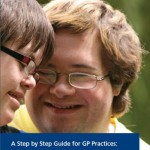
Down syndrome is the most common cause of intellectual disability in the UK and other developed countries. The average life expectancy for babies with Down syndrome born in 2011 in England and Wales was 51 years and the median life expectancy was 58 years. (Wu and Morris 2013)
This shows a dramatic increase in life expectancy in comparison to a median age of death of less than 10 years for children born 50 years ago.
Here Professors Jensen and Bulova, US hospital specialists in paediatrics and internal medicine, review the health care management of adults with Down syndrome.

Down syndrome is the most common cause of intellectual disability in the UK and other developed countries
Method
The authors focused on articles published on Pubmed and the Cochrane Database of Systemic reviews. After this they applied snowball techniques to sources from articles identified from these sources.
It is not clear from the article what the full search strategy used in the initial searches.
Snowballing is useful for identify high quality articles in obscure journals but does have bias in supporting the findings of the original articles found.(Greenhalgh and Peacock 2005)
Findings
They advise that the approach to primary care for adults with Down syndrome should be similar to that for the general adult population, with the addition of screening for conditions specific to Down’s syndrome.
They advise particular vigilance for conditions that are more common in Down syndrome, such as hypothyroidism, obstructive sleep apnea, and osteoporosis.
Adults with Down syndrome have a lower risk of hypertension, coronary artery disease, and solid tumors than the general population.
People with Down syndrome have an increased risk of Alzheimer’s dementia, but not all adults experience this; the onset of dementia is not typically seen before age 40 years. By age 60 years, 40-77% of adults will have Alzheimer’s dementia which has often been preceded by adult onset seizure disorders including mycol.
Respiratory infection is the leading cause of death in adults with Down syndrome
Conclusion and comment
I welcome this important review as a summary of the management of some of the important health issues facing adults with Down syndrome. However providing guidance for primary care in a UK journal should involve UK general practitioners and community learning disability nurse input.
There are areas such as the health conditions among adolescents and young adults that could have been highlighted. Terri Pikora and colleagues identified additional problems in 197 people with Down syndrome aged 15 to 30 years of musculoskeletal problems (affecting 61%) particularly the feet and menstrual conditions among young women (affecting 58%). (Pikora et al 2014)
There were 3 responses to the article (accessed 25.01.2015) which spotlight areas that others felt the review did not cover sufficiently which included transition from paediatric care. UK bases resources for GPs and ocular manifestations.
The guidance needs development into a censuses guideline such as Dr Williams and colleagues’ Canadian Censuses guidelines for primary care of people with developmental disabilities 2011. (Sullivan et al 2011)
The UK Down’s syndrome Association provides useful information for General Practitioners for annual health checks and for Down syndrome related health conditions.
The Royal College of General Practitioners also publishes guidance on these checks which also includes recommendations specific to Down syndrome.
I would have preferred to have clearer guidance on cardiology follow up, primary care treatment of skins conditions and surveillance for disability hate crime.

Clearer guidance needed on cardiology follow up, primary care treatment of skin conditions and surveillance for disability hate crime
Using the latest Quality outcome framework (QOF) data of 2013-14 there is recorded 20,086 people 18 years and older in England with Down syndrome as part of LD002 indicator. With an estimated population 44,667,478 adults 18 years and older in England this gives a prevalence of 0.4 adults with learning disabilities per 1000 of the general population.
There are 7,052 patients in the average GP practice list size so there are 2.82 adults with Down syndrome in the average practice population.
In addition to development of consensus guidelines, the development of age specific and syndrome specific clinical system templates for annual health checks may help primary care. In 2008, the Learning Disability Directed Enhanced Scheme (LD-DES) was introduced by NHS England to incentivise Primary care teams to carry out annual health checks for people with learning disabilities.
On January 9th 2015 John Northfield posted on the National Elf Service on a study I was involved in looking at the quality of annual health checks in England
Amongst the findings was the rate of newly identified health conditions were higher for patients in incentivised practices, including rates of gastrointestinal and thyroid disorders, constipation, and being underweight or obese. (Buszewicz et al 2014)
94,647 people aged 18 and older with learning disabilities received a learning disability health check in England, an increase of (3%) on the 2011-12 but the coverage fell by 1%, from 45% to 44% as numbers on the registers increased.
It would help considerably if Public Health England would publish these figures quarterly and identify the numbers of people with Down syndrome receiving annual health check.
Since April 2014 LD- DES the age range for annual health checks has decreased from 18 years to 14 years and I hope that this change will help involve GPs in the transition of all people with learning disabilities and their carers including those with Down syndrome.
However the loss of the QOF indicator LD002 in 2014, which targeted people with Down syndrome to have an annual thyroid function, has been a backward step.

The loss of QOF indicator targeting people with Down syndrome for annual thyroid function is a backward step
Link
Managing the care of adults with Down’s syndrome, Jensen, K. M. & Bulova, P. D. Managing the care of adults with Down’s syndrome. BMJ 349, g5596–g5596 (2014) [abstract]
References
Wu J, Morris J. The population prevalence of Down’s syndrome in England and Wales in 2011 European Journal of Human Genetics (2013) 21, 1016–1019; doi:10.1038/ejhg.2012.294; [abstract]
Greenhalgh T, Peacock R. Effectiveness and efficiency of search methods in systematic reviews of complex evidence: audit of primary sources. BMJ : British Medical Journal 2005;331(7524):1064-1065. doi:10.1136/bmj.38636.593461.68. [abstract]
Pikora TJ, Bourke J, Bathgate K, Foley K-R, Lennox N, Leonard H. Health Conditions and Their Impact among Adolescents and Young Adults with Down Syndrome. Yoshikawa T, ed. PLoS ONE 2014;9(5):e96868. doi:10.1371/journal.pone.0096868.) [abstract]
Sullivan WF, Berg JM, Bradley E, Cheetham T, Denton R, Heng J, et al. Primary care of adults with developmental disabilities: Canadian consensus guidelines. Can Fam Physician (2011) 57(5):541–53 [abstract]
Assessment of an incentivised scheme to provide annual health checks in primary care for adults with intellectual disability: a longitudinal cohort study, Marta Buszewicz, Catherine Welch, Laura Horsfall, Irwin Nazareth, David Osborn, Angela Hassiotis, Gyles Glover , Umesh Chauhan , Matthew Hoghton, Sally-Ann Cooper, Gwen Moulster, Rosalyn Hithersay, Rachael Hunter, Pauline Heslop, Ken Courtenay, André Strydom in The Lancet Psychiatry, 1, 7, 522 – 530 [abstract]


Today GP @mhoghton on @BMJ_latest clinical review about managing care & support for people with #DownSyndrome http://t.co/AFujreq26N
Down syndrome is the most common cause of intellectual disability in the UK and other developed countries http://t.co/AFujreq26N
People with Down syndrome face significant health issues. Read our summary of a recent clinical review http://t.co/AFujreq26N
Respiratory infection is the leading cause of death in adults with Down syndrome http://t.co/AFujreq26N
Clearer guidance needed on cardiology follow up for people with Down syndrome http://t.co/AFujreq26N
Clearer guidance needed on primary care treatment of skin conditions for people with Down syndrome http://t.co/AFujreq26N
GP @mhoghton calls for clearer guidance on surveillance for disability hate crime in his #DownSyndrome blog today http://t.co/AFujreq26N
Don’t miss: Managing the care of adults with Down syndrome http://t.co/AFujreq26N
@LearningDisElf A shame that hearing loss not in original article. High prevalence in this group, often misdiagnosed as dementia, or missed.
What you need to know about managing heath care of adults with Down Syndrome http://t.co/pgDI2dtOby
Managing the care of adults with Down syndrome http://t.co/c4M8T6n42t via @sharethis